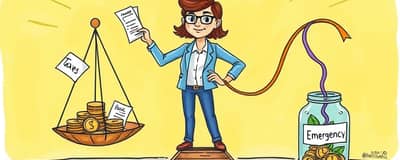Debt Management Tips to Improve Your Credit Health

Building and maintaining healthy credit habits is a journey that combines discipline, knowledge, and actionable strategies. With the right approach, you can reduce your debts, boost your credit score, and secure a brighter financial future.
Understanding the Connection Between Debt Management and Credit Health
Every decision you make regarding borrowing and repayments impacts your credit profile. Your payment history drives nearly thirty-five percent of your credit score. Equally important is maintaining a low credit utilization ratio, which signals to lenders that you use credit responsibly without overextending.
When managed wisely, your debt becomes a tool rather than a burden. Lower outstanding balances yield access to better interest rates, more favorable loan terms, and improved borrowing power.
Review and Assess Your Current Debt Situation
Before crafting a repayment plan, gather a clear snapshot of all existing obligations. List every credit card balance, personal loan, and line of credit. Note the interest rate, minimum payment, and due dates for each account.
Obtain your credit reports from the three major bureaus—Experian, Equifax, and TransUnion. Verify the accuracy of account details and dispute any errors you encounter. A single inaccuracy can unfairly penalize your credit score.
Craft a Realistic Budget
A robust budget is the foundation for sustainable debt reduction and savings growth. Begin by tracking monthly income against essential expenses like housing, food, utilities, and transportation.
Allocate a fixed portion of disposable income to debt repayment. Prioritizing this payment ensures you don’t unintentionally overspend on non-essentials. Consistency is key: small, regular contributions can accelerate progress.
- Record all expenses to identify potential savings.
- Set aside emergency funds to avoid new debt.
- Update your budget quarterly to reflect changing needs.
Debt Repayment Strategies
Selecting the right repayment method can boost motivation and reduce cost. Two popular approaches are the snowball and avalanche methods.
Regardless of method, strive to always pay more than the minimum. Even an extra five or ten dollars per month can shorten repayment by months or years.
Credit Utilization and Responsible Credit Use
Keeping balances below 30 percent of your credit limits is a proven rule of thumb. Lower ratios convey lower risk to potential lenders.
Aim to pay off credit card statements in full each cycle. This practice reduces interest expenses and reinforces your record of on-time payments, which is the single most important factor in score calculation.
Reduce and Consolidate High-Interest Debt
High-interest credit card balances can undermine your progress. Explore balance transfer offers or personal loans to consolidate these debts at lower rates. Always factor in any transfer fees to ensure you’re truly saving money.
Refinancing options exist for student loans, mortgages, and auto loans. When refinancing, compare the annual percentage rate (APR) and loan term to ensure the new arrangement aligns with your goals.
Maintain Good Financial Habits
Establishing strong routines will prevent future debt crises. Automate payments wherever possible to avoid late fees and missed due dates. Regularly review bank statements and credit reports to catch anomalies early.
- Set calendar reminders for non-automated bills.
- Allocate time each month to monitor your credit report.
- Grow your emergency fund to cover three to six months’ expenses.
Seek Professional Help When Needed
If debt feels unmanageable, a certified credit counselor can provide personalized guidance. These experts can negotiate interest rate reductions, develop repayment plans, and offer financial education tailored to your situation.
Don’t hesitate to reach out to non-profit agencies accredited by organizations like the National Foundation for Credit Counseling. Early intervention can prevent deeper financial stress.
Monitor and Protect Your Credit Health
Vigilance is vital. Subscribe to free credit monitoring services or set up alerts through your bank. Promptly dispute any inaccuracies you find on your report.
Be judicious when opening new accounts. Each credit application triggers a hard inquiry, which can temporarily lower your score. Only apply for credit when necessary and when you’re confident in your ability to manage it responsibly.
Broader Benefits of Strong Credit Health
Beyond lower interest rates, a robust credit profile unlocks better insurance premiums, enhanced rental opportunities, and easier qualification for mortgages. Financial peace of mind also reduces stress and fosters healthier relationships.
- Access to premium credit cards with rewards.
- Greater negotiating power with lenders.
- Long-term wealth-building potential.
Adopting disciplined debt management practices empowers you to reach milestones sooner—whether buying a home, starting a business, or funding retirement. Begin today, stay consistent, and watch your credit health flourish.
References
- https://www.westernsouthern.com/personal-finance/debt-management-tips
- https://www.ameriprise.com/financial-goals-priorities/personal-finance/effective-debt-management
- https://investor.vanguard.com/investor-resources-education/article/how-to-manage-debt
- https://ccplohio.libguides.com/c.php?g=1419529&p=10522514
- https://www.peachstatefcu.org/blog/crush-your-debt-and-boost-your-credit-5-strategies-for-lasting-financial-health
- https://www.prism-medical.com/credit-wellness-how-improving-your-credit-can-boost-mental-health-and-strengthen-relationships/
- https://www.wellsfargo.com/financial-health/credit-and-debt/
- https://blog.harvardfcu.org/how-to-stay-financially-healthy-tips-for-managing-debt-in-2025






